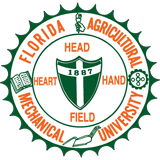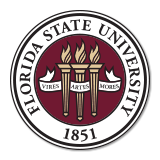
Simeon Newman, an undergraduate in chemical engineering at the joint college and Florida A&M University, recently won a prestigious research award for his work on norovirus. (Scott Holstein/FAMU-FSU College of Engineering)
Simeon Newman received the American Chemical Society award for best undergraduate poster in the Division of Polymeric Materials Science and Engineering (PMSE) for his project entitled, “Progress in the Development of Modular Gylcopolymers Tailored to Inhibit Norovirus Infections.”
He is an undergraduate chemical engineering student at the FAMU-FSU College of Engineering and Florida A&M University.
Norovirus is a highly infectious virus that infects almost 700 million people annually. Newman’s paper highlights a process to manipulate the structure of polymers to maximize viral inhibition. The work may result in materials that provide a new approach to treating norovirus infections. The project was fostered through research with the GlycoTree program Newman did at Virginia Tech over the summer.
“Being enrolled at an HBCU afforded me immense opportunities to develop my scientific and engineering acuity,” Newman said. “Because of this, I got accepted to the GlycoTree program at Virginia Tech, where I worked with Professor Michael Schulz on developing modular glycopolymers for norovirus inhibition.”
That experience culminated in Newman’s winning entry for best undergraduate poster. Through FAMU and the college, he has pursued independent research, attended conferences and received numerous internship opportunities because of the high-quality connections with industry.
Newman works with Natalie Arnett, an associate professor at the joint college, on another project to remediate pollutants and impurities from groundwater and soil.
“We hope to substantially mitigate the health and safety impediments that plague communities most affected by polluted drinking water,” Newman said.
“Excessive nitrates in groundwater are problematic because they can impede the blood’s ability to carry oxygen,” Newman said. “This can lead to Blue Baby Syndrome, excessive fatigue and languidness in older adults.”
Agricultural runoff can cause these excessive nitrates. The problem is severe enough that some countries in the E.U. have enacted protocols to remove them from groundwater.
Newman’s latest project involves removing nitrates by adhering them to a polymer surface through adsorption. The next step is exploring the adsorption efficiency of polymer mixes that can remediate heavy metals like lead, zinc and mercury.
Newman continued, “The best part is seeing the diversity and intersectionality of science and engineering. It is also a humbling experience to witness the amazing research for a vast range of subjects at both universities.”
The undergrad is on track to earn a bachelor’s degree from FAMU in 2025. He plans to continue to his doctorate in engineering.
About the Award
A distinguished group of judges determined the PMSE Division’s Best Poster Competition winners at the American Chemical Society meeting held in March 2024 in New Orleans.
RELATED ARTICLES
Engineering Researcher Lands New $800,000 NSF Grant to Fuel Opportunities for FAMU Students

